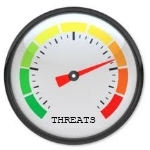
by Mitz Pantic from Tips4pc.com
7 Computer Threats You Might Miss
Some computer threats aren’t immediately apparent, and they aren’t often talked about by the so-called experts. They’re risks that you can’t block by just turning on your anti-virus software or by avoiding certain email attachments. Let’s look at seven of these threats now.
1—Unprotected Home WiFi
The easiest wireless router to connect to is the unprotected wireless router. There’s no password, so there’s no hassle when you want to connect. That’s a tempting reason to setup your home router with an open connection, but I suggest you take the extra few minutes to password-protect your router.
There’s two reasons—privacy and liability. I’ll discuss privacy in another section because the liability part can get you sent to jail.
If you own an open router, anyone can connect to the Internet through your router. Sure, that means they can hog your bandwidth, but that isn’t as much as a problem as when they use your Internet connection to do something illegal—such as download child pornography.
When the police discover someone do something illegal on the Internet, they track down the Internet Protocol (IP) address of the offender. Then they contact the Internet Service Provider (ISP) which owns that IP address and get the home address for the customer using that IP addresses so they can get an arrest warrant.
If the police track the IP address back to your wireless router, they’re going to arrest you, not the person who was accessing the Internet through your open router. You may be able to make a case in court that it wasn’t you, but it will probably cost you thousands of dollars in legal fees to make that point in addition to the jail time, bond money, and cost to your career of being accused of downloading child pornography.
The five minutes it takes to secure your router can avoid all of that, so I highly recommend it.
2—Unprotected Public Wifi
When you use an unprotected wireless connection in public, anyone within range of the router (which can be up to a mile with the right equipment) can snoop on your connection.
Not only can they see the same web pages you visit, but they can also access the hidden HTTP cookie your Web browser sends to websites to identify you.
For example, you login to Facebook, whether at home or in public. When you open up Facebook at the public coffee shop, your computer sends a secret message (cookie) to Facebook saying, “This is _____. Remember me?” Facebook verifies the secret and lets you access your wall and other information.
But when you send that cookie at the coffee shop on the unprotected connection, anyone else who is listening to the wireless connection can grab your cookie. Then they can send it to Facebook and Facebook will show them your wall and other information.
This method doesn’t just apply to Facebook, but almost every website on the Internet. The only websites which are secure are the websites which run in SSL (HTTPS) mode all the time. Your Web browser indicates you’re on a secure website by turning the address bar green or gold. (Different colors for different browsers.)
I recommend that you avoid unprotected Internet, but if you must use it, open your Web browser in private mode (also called incognito)—look in the File menu or try pressing Ctrl-Shift-N. Private mode won’t send any of your usual cookies, so as long as you don’t log into any sites, you should be safe.
3—Losing It All
What if a hacker uses the above technique or another technique to access your online account, what is he likely to do? The answer, unfortunately, includes a likely possibility that he’ll wipe out all of your data.
Some hackers are just bad intentioned—they delete all of your data out of spite. Other hackers use your account for some scam, but then they delete all of your data to make it harder for your to undo the scam.
For example, a common scam is the Western Union scam. A hacker breaks into your email account and sends everyone in your address book an email telling them you’re stuck in a foreign country and you’ve lost your wallet. The email continues with a plea for your friends to send you a few hundred dollars by Western Union Moneygram.
If your friends and family do send money, it’ll be picked up by an associate of the scammer and will never be seen again. (Moneygrams are not refundable when fraud occurs.)
To make it harder for you to ruin this scheme, hackers will delete your entire email address book and all of your old messages so you can’t find the addresses for your friends and family to tell them that you’ve been hacked and that the money request is a scam.
As I said earlier, that unfortunately leaves you without email or address book. Scammers will also delete your information off of social media sites for the same reason, leaving you without any friends or followers.
For this reason, you should use secure passwords, avoid unprotected wireless connections, and backup your online data if possible. GMail and several other online email sites make backups easy, and I highly encourage you to make regular backups part of your monthly or weekly schedule. (GMail will also provide automatic backups for about $5 a month.)
Article Continued Here
This excerpt appears with permission from Tips4PC.com.




